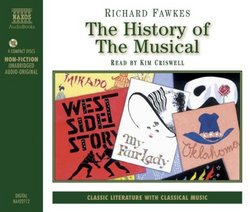The great song composers and lyricists are presented
Midwest Book Review | Oregon, WI USA | 01/06/2002
(5 out of 5 stars)
"Richard Fawkes' The History Of The Musical is a flawlessly recorded, 4 cassette, unabridged audiobook showcasing the development of the musical, from its origins in European light opera and operetta to its it's golden age in the American theater. The great song composers and lyricists are presented including Jerome Kern, Irving Berlin, George Gershwin, Rodgers and Hammerstein, Lerner and Loewe, Lloyd Webber, and Sondheim. The wonderfully narrated text by the award-winning Broadway singer Kim Criswell is enhanced with almost one hundred famous musical extracts. The History Of The Musical is a "must" for personal, academic, and community library music history and audiobook collections."
Should be twice as long
F. Behrens | Keene, NH USA | 12/14/2001
(5 out of 5 stars)
"Surely there must be a medal somewhere out there for Naxos records and for author Richard Fawkes. After two superb sets of tapes and CDs titled "The History of Classical Music" and "The History of Opera," there is now available Mr. Fawkes' "The History of the Musical" (NA422712). Here we have singer/actress Kim Criswell narrating on 4 CDs or tapes just under 320 minutes of exactly what the title promises. Starting with "The Beggar's Opera" of 1728, the history of the genre is traced up to the time of writing, meaning "Les Miserables." Along the way, we consider operetta, the English Music Hall, American vaudeville, the review, the book show, the familiar, the off-beat, the dead ends, the highly influential. And the London stage gets a good deal of attention also, thereby introducing a lot of material not very well known to those better versed in the American musical. As with any good effort of this sort, a strong connection is drawn between the changing times and the changing concepts of what a musical should be. The importance of "Show Boat" is not glossed over, for example, nor is the other shock caused by "Pal Joey." The reliance of Lloyd Webber on staging is mentioned but not his lack of more than one fairly memorable melody per show. In general, the tone is upbeat and positive. But this is a recording. While it could never include all the information found in a book, its dozens of recorded examples are what makes this set priceless. Where possible, the oldest "original cast" recordings are used. On the other hand, there are some strange exceptions such as "Hey there" from "Pajama Game" being sung not by John Raitt but by Ron Raines on the Jay recording. I suspect this is because Criswell is in the cast of that set. Again, this set is in tape and CD formats. For educational purposes, the CDs offer direct access to any show under discussion--and the CDs are very generously divided into nearly 200 tracks! Very considerate of the producers. The booklet offers a nice little personal essay by Criswell. So if I have any complaint about this set, it is that I wish it were twice as long."



